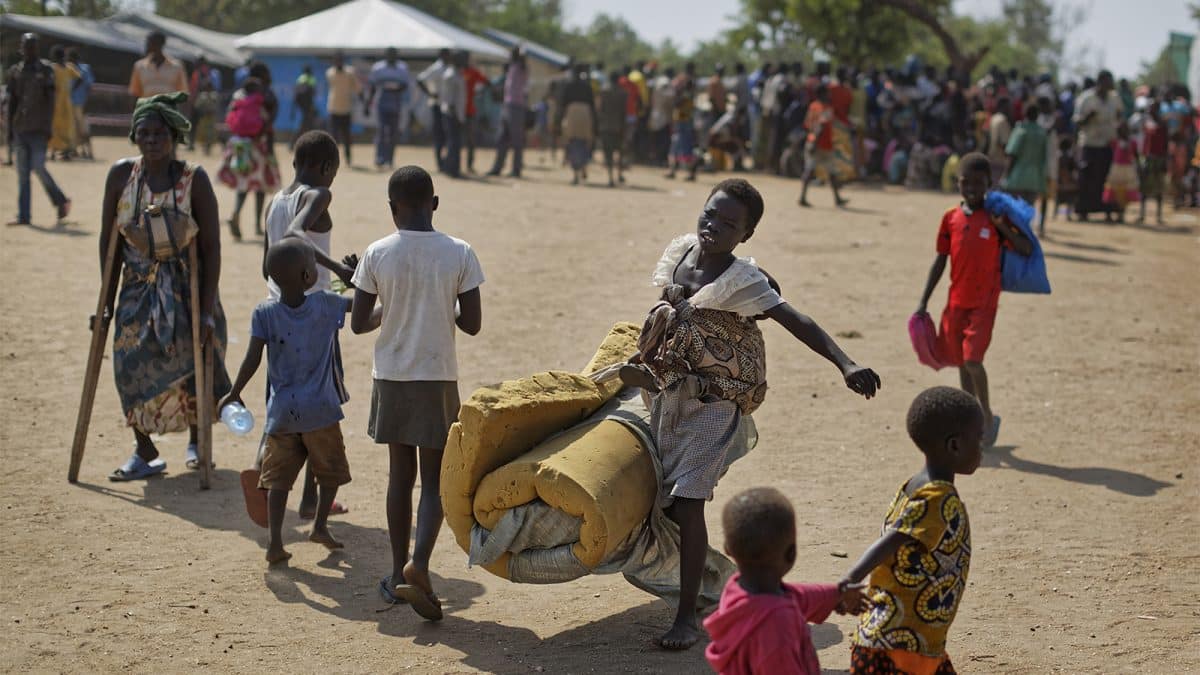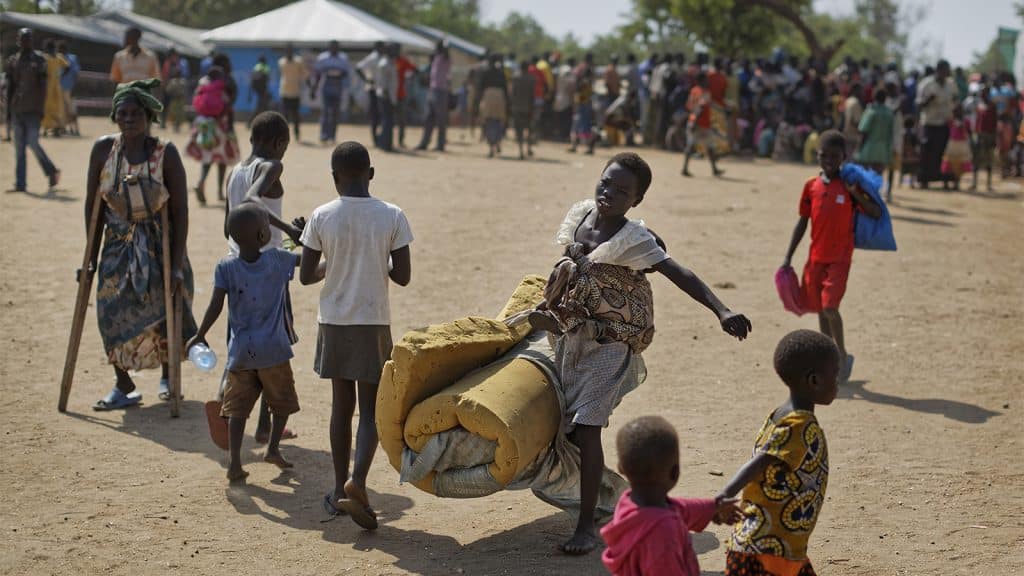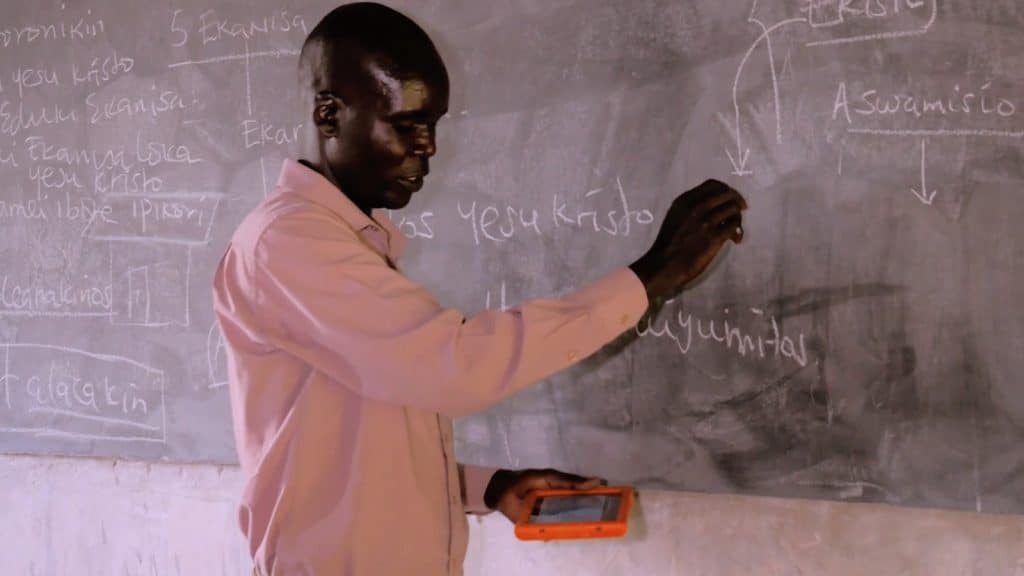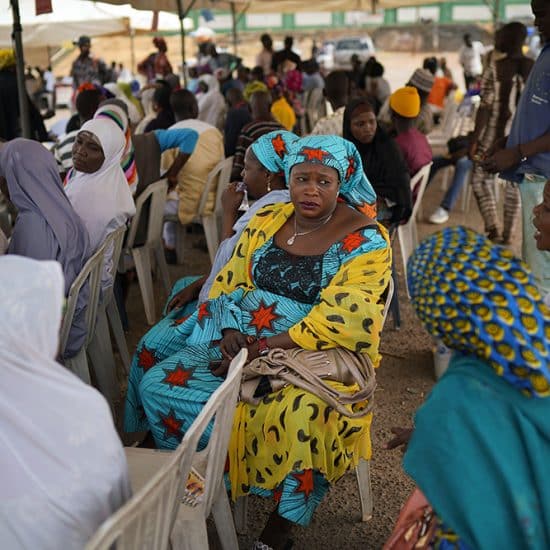

A South Sudanese refugee girl with a baby on her back carries a foam mattress to the communal tent where they will sleep, at the Imvepi reception center, where newly arrived refugees are processed before being allocated plots of land in nearby Bidi Bidi refugee settlement, in northern Uganda, on June 9, 2017. The number of South Sudanese refugees sheltering in Uganda has reached 1 million, the United Nations said on Aug. 17, 2017, a grim milestone in what has become the world’s fastest-growing refugee crisis. (AP Photo/Ben Curtis)
KAMPALA, Uganda (RNS) — On a recent Sunday morning, dozens of South Sudanese refugees gathered inside a tent at Imvepi Refugee Camp to thank God for enabling them to found a new church.
The new Pentecostal church was partly made possible by a new app that links preachers to Bible translations and theological resources from which they can prepare sermons and teach congregants about their faith.
“It’s a new dawn for refugees,” said Pastor Chol Mayak, 48, a father of four who recently attended a training on the app. “We are going to train other refugees so that they can open more churches and spread the gospel across the camps.”
The eVitabu app was developed by Jonathan Haddock and Michael Berry, who are members of Canterbury Baptist Church in the United Kingdom. The app was launched last year by the African Pastors Fellowship. The group provides pastors with durable solar-powered Android tablets that have the app pre-installed, turning the device into an engine for spiritual and pastoral growth.

People browse the eVitabu app on a tablet provided by African Pastors Fellowship. Video screenshot via African Pastors Fellowship
The digital library has done much to replace the reference books many South Sudanese churches lost to the tumult of the country’s civil war. Pastor Mayak, of the Soul Pentecostal Church, fled Yei, a town in South Sudan’s southwest, after government forces attacked, setting fire to his church and his congregants’ homes. All of the church’s Bibles were lost, along with the pastor’s books. He has been unable to continue with his ministry since.
The app is equally aimed at improving the quality of clergy for Africans unaffected by violence. The African Pastors Fellowship, a charity based in the U.K., estimates that more than 3 million churches in the developing world are led by people with few or no qualifications. In Africa, the organization estimates that more than 90 percent of pastors have never received a single day’s training on their responsibilities. The APF’s app is designed to help with this knowledge shortage as well.
But the immediate boon has been the sudden availability of biblical texts for South Sudanese, some of whom fled their war-torn country as long as five years ago. Since the app became available, more than a dozen churches have been established in the more than 20 refugee camps in northern Uganda.

A man uses the eVitabu app on a tablet while teaching. Video screenshot via African Pastors Fellowship
Rev. Alex Sokiri, who recently planted a church in Morobi refugee camp, was able to do so only after being trained on how to use the eVitabu app.
Sokiri and his wife, Harriet, lost all their possessions after militants raided residents of Kajo Keji in South Sudan in July of 2016. “It was hard to encourage people who were disturbed and traumatized because of the civil war,” he said. “There were no Bibles in the camp, and we had lost everything in South Sudan. I told members of our church to continue to pray so that God opens a way.”
Sokiri can browse and download the searchable library for the lessons that he uses to teach and support other pastors and congregations in the camps.
“The app provides information on how to plant a church, offer counseling and farming. It’s changing the lives of refugees.”
Deng Bol, a refugee at Imvepi Refugee Camp, agreed.
“The eVitabu app is really helping refugees,” he said. “I have been traumatized for the last one year after I lost my family in Yei, but our pastor has been counseling me using the information in the gadget. It’s helpful.”






